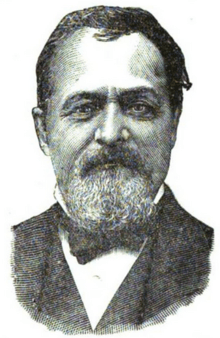Gwilym Gwent

Gwilym Gwent (28 November 1834 – 3 July 1891) born William Aubrey Williams, was a Welsh composer.
Early life
William Aubrey Williams was born at Tredegar in 1834. As a boy he sang in a choir with his uncle, and trained as a blacksmith. He won prizes for two compositions at the Aberystywyth eisteddfod in 1865.[1]
Coal mines and music
Williams emigrated to America with his wife Cecilia Williams in 1872; they settled in Plymouth, Pennsylvania, in the Wyoming Valley, and (like many other Welsh immigrants there) found work at the anthracite mines. As a blacksmith at Nottingham Colliery, he wrote scores in chalk on any available surface, including the sides of coal cars, earning the nickname "Mozart of the Mines."[2] Although he was in America, he continued to submit compositions and win awards at eisteddfod. His best-known compositions include "Yr Haf (The Summer)", "Y Gwanwyn (The Spring)", and "Y Clychau (The Bells)", all songs for glee choirs.[3]
Williams led the first brass band in Wilkes-Barre, Pennsylvania. He also edited a collection of Welsh hymns with Thomas Jenkins.[4]
Death and legacy
He died in 1891, age 56. His funeral drew more than 5000 mourners. Four years later, sufficient funds were raised from the community[5] for a monument to his memory which was unveiled at Hollenback Cemetery in Wilkes-Barre, with music for the occasion provided by Clara Novello Davies and the Royal Welsh Ladies' Choir, then touring America.[3][6]
In 1934, a gathering of 500 Welsh-Americans in Wilkes-Barre, including his three daughters, marked the centennial of Gwilym Gwent's birth.[7] Judge Arthur H. James spoke on the occasion:
"Gwilym Gwent spread joy and music among the hearts of his people. He gathered neither wealth nor power, but received his reward by interpreting in music the beauties he saw around him. He left a sweetness that half a century still finds un-dimmed."[7]
References
- ↑ Robert David Griffith, "William Aubrey Williams" Dictionary of Welsh Biography (National Library of Wales 2009).
- ↑ "'Gwilym Gwent' Extols 'Mozart of the Mines'" Wilkes-Barre Record (January 28, 1949): 26. via Newspapers.com

- 1 2 "The Late William Aubrey Williams (Gwilym Gwent), Plymouth, Pa." The Cambrian 15(12)(December 1895): 353-357.
- ↑ "William Aubrey Williams" in Robert Evans and Maggie Humphreys, eds., Dictionary of Composers for the Church in Great Britain and Ireland (Bloomsbury Publishing 1997): 362. ISBN 9781441137968
- ↑ "In Honor of Gwent" Scranton Republican (November 25, 1892): 5. via Newspapers.com

- ↑ "The Gwilym Gwent Monument; It was Yesterday Unveiled in Hollenback Cemetery with Pious Eclat" Scranton Republican (October 17, 1895): 8. via Newspapers.com

- 1 2 "Throng Honors Gwilym Gwent" Wilkes-Barre Record (July 30, 1934): 13. via Newspapers.com
